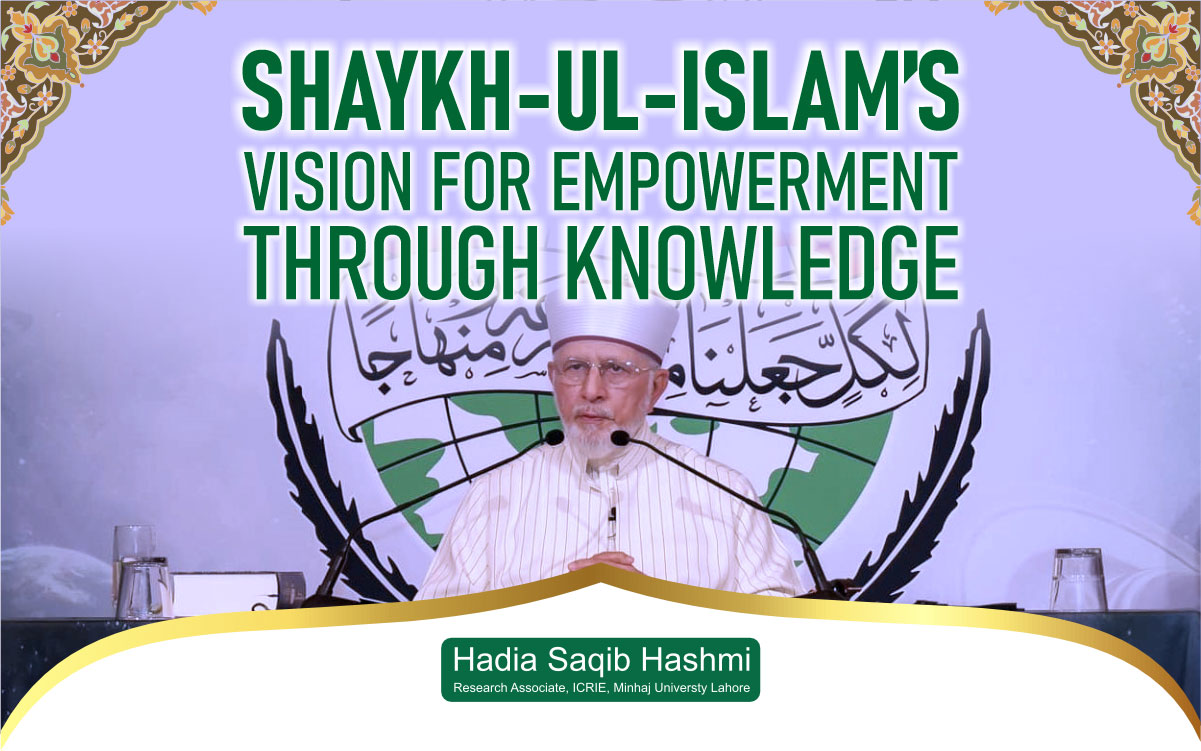Shaykh-ul-Islam Prof. Dr. Muhammad Tahir-ul-Qadri is a highly respected scholar, educationist, and social reformer whose vision for Minhaj University Lahore has profoundly transformed the academic and cultural landscape of Pakistan. Founded with a mission to combine world-class education with moral and ethical principles, Minhaj University has emerged as a beacon of hope for students aspiring to excel in modern disciplines while staying deeply rooted in spiritual and cultural values. Over the years, more than 15,000 students have enrolled at the university, availing themselves of programs that integrate a global outlook with the finest academic and moral standards.
Under the able leadership of Shaykh-ul-Islam, Minhaj University Lahore has constantly evolved to address the changing needs of society. Recognizing the importance of promoting peace and tackling extremism, the university established the Department of Peace and Counter Terrorism. This unique department serves as a pioneering platform for research, training, and dialogue to counter negative narratives, equipping students with skills to advocate for harmony and tolerance in an increasingly complex world. Such forward-thinking initiatives reflect the lifelong dedication of Shaykh-ul-Islam to bringing about social justice and sustainable peace in Pakistan and beyond.
In addition to its academic innovations, Minhaj University remains one of the most affordable private-sector institutions in the country. This affordability does not come at the expense of quality; rather, it aligns perfectly with Shaykh-ul-Islam’s vision of ensuring education is accessible to students from diverse socioeconomic backgrounds. Scholarships, financial aid programs, and reduced tuition rates collectively help lower financial barriers, thus creating opportunities for students who otherwise might not be able to pursue higher education.
Crucial to the success and continual advancement of the university is the stewardship of Shaykh-ul-Islam’s son, Prof. Dr. Hussain Mohi-ud-Din Qadri, who serves as Deputy Chairman of the Board of Governors. His dynamic leadership, guided by the foundational values laid out by his father, helps efficiently oversee the university’s growth, academic programs, and strategic direction. Working hand in hand, both father and son ensure that Minhaj University’s educational framework remains grounded in ethical teachings while also being informed by contemporary academic trends.
On-campus, Minhaj University Lahore showcases its commitment to spiritual and cultural enrichment through the establishment of the Shaykh-ul-Islam Spiritual Center. This center serves as a reflective space for students, faculty, and visitors, reminding them of the profound spiritual heritage upon which the university was founded. Additionally, the university’s Naat Research Center is a testament to Shaykh-ul-Islam’s devotion to preserving and promoting traditional forms of devotional literature. By dedicating research efforts to Naat, the university underscores the importance of spiritual expression within an educational setting, allowing students to engage academically with this significant genre of Islamic poetry.
Moreover, Minhaj University embodies several unique features that distinguish it from other higher education institutions in Pakistan. Its integrated model of education encourages holistic development, combining theoretical knowledge with practical skill-building. The emphasis on promoting values like respect, tolerance, and empathy permeates every aspect of campus life, inspiring students to become compassionate professionals who contribute positively to society. Cutting-edge research facilities and continual encouragement for academic innovation further allow the university to remain at the forefront of intellectual progress.
Shaykh-ul-Islam Prof. Dr. Muhammad Tahir-ul-Qadri’s contributions through Minhaj University Lahore extend well beyond the realm of academics, reaching into areas of social welfare, community development, and intercultural harmony. By weaving ethical values into every facet of education, he has ensured that graduates emerge not only with scholarly competence but also with a profound sense of civic responsibility. This dual emphasis on intellectual and moral development has inspired countless students and faculty to use their knowledge and skills for the betterment of society.
One of the most impactful services provided under his leadership is the university’s focus on community outreach. Numerous workshops, seminars, and training sessions target pressing social issues such as poverty alleviation, women’s empowerment, and youth leadership. These initiatives often bring together subject experts, policymakers, and students, fostering collaborative solutions to challenges faced by local communities.
Another major contribution to society is the creation of specialized departments and research centers with a social welfare dimension. The Department of Peace and Counter Terrorism exemplifies this approach by focusing on strategies to combat extremism and foster social cohesion. This endeavor also serves as a platform for intercultural dialogue, promoting open discussions on peaceful coexistence and mutual respect. Meanwhile, the Shaykh-ul-Islam Spiritual Center and the Naat Research Center nurture spiritual reflection and cultural preservation. These centers not only enrich the campus environment but also radiate their positive influence throughout the broader community, emphasizing the importance of moral integrity and a deep love for traditional devotional expressions.
The university’s affordability is itself a remarkable service to society, especially in a country where quality private higher education can be financially burdensome. Shaykh-ul-Islam’s emphasis on access and equity has made Minhaj University one of the most cost-effective private institutions in Pakistan, enabling students from diverse economic backgrounds to pursue higher education. By offering scholarships and financial aid, the university removes barriers that might otherwise prevent talented individuals from realizing their potential. This commitment to inclusivity significantly impacts local communities by producing graduates who are both well-prepared and motivated to serve, irrespective of their own socioeconomic origins.
Furthermore, the university’s various student-led clubs and organizations engage in volunteer programs and social upliftment campaigns, often conducted in tandem with Minhaj-ul-Quran International’s extensive humanitarian network. From blood donation drives and health camps to distributing relief materials during emergencies, these initiatives reflect the compassionate ethos championed by Shaykh-ul-Islam. By encouraging students to work alongside faculty and external partners on projects that address community needs, the university ensures that the spirit of service is embedded in the academic experience.
In essence, every dimension of Minhaj University Lahore—from its visionary educational model to its extracurricular engagement—bears the stamp of Shaykh-ul-Islam Prof. Dr. Muhammad Tahir-ul-Qadri’s commitment to uplifting society. His leadership, in partnership with Prof. Dr. Hussain Mohi-ud-Din Qadri and the wider university community, has created an ecosystem where academic rigor, moral values, and social responsibility converge. Through these collective efforts, Minhaj University continues to shape responsible citizens who, grounded in spiritual integrity and driven by intellectual excellence, actively contribute to the advancement of both their local communities and the broader global society.



